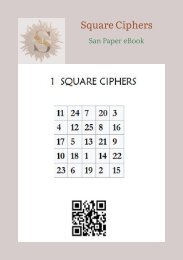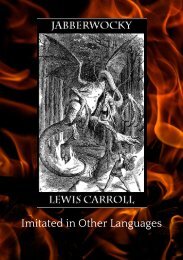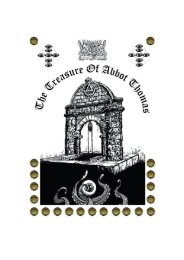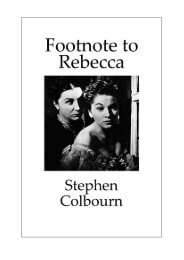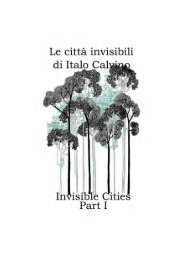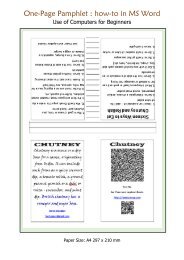You also want an ePaper? Increase the reach of your titles
YUMPU automatically turns print PDFs into web optimized ePapers that Google loves.
The Garden<br />
The Garden<br />
<br />
of <strong>Forking</strong><br />
<strong>Paths</strong><br />
parallel text<br />
Jorge Luis Borges
EL JARDÍN DE<br />
SENDEROS QUE SE<br />
BIFURCAN<br />
<br />
Jorge Luis Borges<br />
A Victoria Ocampo<br />
The Garden of<br />
<strong>Forking</strong> <strong>Paths</strong><br />
Jorge Luis Borges<br />
1941
EN LA PÁGINA 242 de la Historia de la Guerrra<br />
Europea de Lidell Hart, se lee que una ofensiva<br />
de trece divisiones británicas (apoyadas por mil<br />
cuatrocientas piezas de artillería) contra la<br />
línea Serre-Montauban había sido planeada<br />
para el 24 de julio de 1916 y debió postergarse<br />
hasta la mañana del día 29. Las lluvias<br />
torrenciales (anota el capitán Lidell Hart)<br />
provocaron esa demora —nada significativa,<br />
por cierto. La siguiente declaración, dictada,<br />
releída y firmada por el doctor Yu Tsun,<br />
antiguo catedrático de inglés en<br />
la Hochschule de Tsingtao, arroja una<br />
insospechada luz sobre el caso. Faltan las dos<br />
páginas iniciales.<br />
“... y colgué el tubo. Inmediatamente después,<br />
reconocí la voz que había contestado en<br />
alemán. Era la del capitán Richard Madden.<br />
Madden, en el departamento de Viktor<br />
Runeberg, quería decir el fin de nuestros afanes<br />
y —pero eso parecía muy secundario, o debería<br />
parecérmelo— también de nuestras vidas.<br />
Quería decir que Runeberg había sido arrestado<br />
o asesinado[1]. Antes que declinara el sol de ese<br />
día, yo correría la misma suerte.
ON PAGE 242 of Liddell Hart’s History of World<br />
War I, you will read that an attack against the<br />
Serre-Montauban line by thirteen British<br />
divisions (supported by 1,400 artillery pieces),<br />
planned for the 24th of July, 1916, had to be<br />
postponed until the morning of the 29th. The<br />
torrential rains, Captain Liddell Hart comments,<br />
caused this delay, an insignificant one, to be<br />
sure. The following statement, dictated, reread<br />
and signed by Dr. Yu Tsun, former professor of<br />
English at the Hochschule at Tsingtao, throws an<br />
unsuspected light over the whole affair. The first<br />
two pages of the document are missing.<br />
<br />
“. . . and I hung up the receiver. Immediately<br />
afterwards, I recognized the voice that had<br />
answered in German. It was that of Captain<br />
Richard Madden. Madden’s presence in Viktor<br />
Runeberg’s apartment meant the end of our<br />
anxieties and—but this seemed, or should have<br />
seemed, very secondary to me—also the end of<br />
our lives. It meant that Runeberg had been<br />
arrested or murdered.[1]<br />
Before the sun set on that day, I would<br />
encounter the same fate.
Madden era implacable. Mejor dicho, estaba<br />
obligado a ser implacable. Irlandés a las órdenes<br />
de Inglaterra, hombre acusado de tibieza y tal vez<br />
de traición ¿cómo no iba a brazar y agradecer este<br />
milagroso favor: el descubirmiento, la captura,<br />
quizá la muerte de dos agentes del Imperio<br />
Alemán? Subí a mi cuarto; absurdamente cerré la<br />
puerta con llave y me tiré de espaldas en la<br />
estrecha cama de hierro. En la ventana estaban<br />
los tejados de siempre y el sol nublado de las seis.<br />
Me pareció increíble que es día sin premoniciones<br />
ni símbolos fuera el de mi muerte implacable. A<br />
pesar de mi padre muerto, a pesar de haber sido<br />
un niño en un simétrico jardín de Hai Feng ¿yo,<br />
ahora, iba a morir? Después reflexioné que todas<br />
las cosas le suceden a uno precisamente,<br />
precisamente ahora. Siglos de siglos y sólo en el<br />
presente ocurren los hechos; innumerables<br />
hombres en el aire, en la tierra y el mar, y todo lo<br />
que realmente me pasa me pasa a mí... El casi<br />
intolerable recuerdo del rostro acaballado de<br />
Madden abolió esas divagaciones. En mitad de mi<br />
odio y de mi terror (ahora no me importa hablar<br />
de terror: ahora que he burlado a Richard<br />
Madden, ahora
Madden was implacable. Or rather, he was obliged<br />
to be so. An Irishman at the service of England, a<br />
man accused of laxity and perhaps of treason, how<br />
could he fail to seize and be thankful for such a<br />
miraculous opportunity: the discovery, capture,<br />
maybe even the death of two agents of the German<br />
Reich? I went up to my room; absurdly I locked the<br />
door and threw myself on my back on the narrow<br />
iron cot. Through the window I saw the familiar<br />
roofs and the cloud-shaded six o’clock sun. It<br />
seemed incredible to me that day without<br />
premonitions or symbols should be the one of my<br />
inexorable death. In spite of my dead father, in spite<br />
of having been a child in a<br />
symmetrical garden of Hai Feng, was I—now—going<br />
to die? Then I reflected that everything happens to a<br />
man precisely, precisely now. Centuries of centuries<br />
and only in the present do things happen; countless<br />
men in the air, on the face of the earth and the sea,<br />
and all that really is happening is happening to me.<br />
The almost intolerable recollection of Madden’s<br />
horselike face banished these wanderings. In the<br />
midst of my hatred and terror (it means nothing to<br />
me now to speak of terror, now that I have mocked<br />
Richard Madden, now that my
que mi garganta anhela la cuerda) pensé que<br />
ese guerrero tumultuoso y sin duda feliz no<br />
sospechaba que yo poseía el Secreto. El nombre<br />
del preciso lugar del nuevo parque de artillería<br />
británico sobre el Ancre.Un pájaro rayó el cielo<br />
gris y ciegamente lo traduje en un aeroplano y a<br />
ese aeroplano en mucho (en el cielo francés)<br />
aniquilando el parque de artillería con bombas<br />
verticales. Si mi boca, antes que la dehiciera un<br />
balazo, pudiera gritar ese nombre de modo que<br />
los oyeran en Alemania ... Mi voz humana era<br />
muy pobre. ¿Cómo hacerla llegar al oído del<br />
Jefe? Al oído de aquel hombre enfermo y<br />
odioso, que no sabía de Runeberg y de mí sino<br />
que estábamos en Staffordshire y que en vano<br />
esperaba noticias nuestras en su árida oficina<br />
de Berlín, examinando infinitamente<br />
periódicos... Dije en voz alta: Debo huir. Me<br />
incorporé sin ruido, en una inútil perfección de<br />
silencio, como si Madden ya estuviera<br />
acechándome. Algo—tal vez la mera<br />
ostentación de probar que mis recursos eran<br />
nulos—me hizo revisar mis bolsillos. Encontré<br />
lo que sabía que iba a encontrar.
throat yearns for the noose) it occurred to me<br />
this tumultuous and doubtless happy warrior<br />
did not suspect that I possessed the Secret. The<br />
name of the exact location of the new British<br />
artillery park on the River Ancre. A bird streaked<br />
across the gray sky and blindly I translated it<br />
into an airplane and that airplane into many<br />
(against the French sky) annihilating the artillery<br />
station with vertical bombs. If only my mouth,<br />
before a bullet shattered it, could cry out that<br />
secret name so it could be heard in Germany …<br />
My human voice was very weak. How might I<br />
make it carry to the ear of the Chief? To the ear<br />
of that sick and hateful man who knew nothing<br />
of Runeberg and me save that we were in<br />
Staffordshire and who was waiting in vain for<br />
our report in his arid office in Berlin, endlessly<br />
examining newspapers . . . I said out loud: I must<br />
see. I sat up noiselessly, in a useless perfection<br />
of silence, as if Madden were already lying in<br />
wait for me. Something—perhaps the mere vain<br />
ostentation of proving my resources were nil—<br />
made me look through my pockets. I found what<br />
I knew I would find.
El reloj norteamericano, la cadena de níquel y<br />
la moneda cuadrangular, el llavero con las<br />
comprometedoras llaves inútiles del<br />
departamento de Runeberg, la libreta, un carta<br />
que resolví destruir inmediatamente (y que no<br />
destruí), el falso pasaporte, una corona, dos<br />
chelines y unos peniques, el lápiz rojo-azul, el<br />
pañuelo, el revólver con una bala.<br />
Absurdamente lo empuñé y sopesé para darme<br />
valor. Vagamente pensé que un pistoletazo<br />
puede oírse muy lejos. En diez minutos mi plan<br />
estaba maduro. La guía telefónica me dio el<br />
nombre de la única persona capaz de transmitir<br />
la noticia: viviía en un suburbio de Fenton, a<br />
menos de media hora de tren.<br />
Soy un hombre cobarde. Ahora lo digo, ahora<br />
que he llevado a término un plan que nadie no<br />
calificará de arriesgado. Yo sé que fue terrible<br />
su ejecución. No lo hice por Alemania, no. Nada<br />
me importa un país bárbaro, que me ha<br />
obligado a la abyección de ser un espía.<br />
Además, yo sé de un hombre de Inglaterra —un<br />
hombre modesto— que para mí no es menos<br />
que Goethe.
The American watch, the nickel chain and the<br />
quadrangular coin, the key ring with the<br />
incriminating useless keys to Runeberg’s<br />
apartment, the notebook, a letter which I<br />
resolved to destroy immediately (and which I did<br />
not destroy), a crown, the false passport, two<br />
shillings and a few pence, the red and blue<br />
pencil, the handkerchief, the revolver with one<br />
bullet. Absurdly, I took it in my hand and<br />
weighed it in order to inspire courage within<br />
myself. Vaguely I thought that a pistol report can<br />
be heard at a great distance. In ten minutes my<br />
plan was perfected. The telephone book listed<br />
the name of the only person capable of<br />
transmitting the message; living in a suburb of<br />
Fenton, less than half an hour away by train.<br />
I am a cowardly man. I say it now, now that I<br />
have carried to its end a plan whose perilous<br />
nature no one can deny. I know its execution<br />
was terrible. I didn’t do it for Germany, no. I care<br />
nothing for a barbarous country which imposed<br />
upon me the abjection of being a spy. Besides, I<br />
know of a man from England—a modest man—<br />
who for me is no less great than Goethe.
Arriba de una hora no hablé con él, pero<br />
durante una hora fue Goethe... Lo hice, porque<br />
yo sentía que el Jefe tenía en poco a los de mi<br />
raza -a los innumerables antepasados que<br />
confluyen en mí. Yo quería probarle que un<br />
amarillo podía salvar a sus ejércitos. Además,<br />
yo debía huir del capitán. Sus manos y su voz<br />
podían golpear en cualquier momento a mi<br />
puerta. Me vestí sin ruido, me dije adiós en el<br />
espejo, bajé, escudriñé la calle tranquila y salí.<br />
La estación no distaba mucho de casa, pero<br />
juzgué preferible tomar un coche. Argüí que así<br />
corría menos peligro de ser reconocido; el<br />
hecho es que en la calle desierta me sentía<br />
visible y vulnerable, infinitamente. Recurdo<br />
que le dije al cochero que se detuviera un poco<br />
antes de la entrada central. Bajé con lentitud<br />
voluntaria y casi penosa; iba a la aldea de<br />
Ashgove, pero saqué un pasaje para una<br />
estación más lejana. El tren salía dentro de muy<br />
pocos minutos, a las ocho y cincuenta. Me<br />
apresuré: el próximo saldría a las nueve y<br />
media. No había casi nadie en el andén. Recorrí<br />
los coches: recuerdo a unos labradores, una<br />
enlutada, un joven que leía con fervor Los
I had talked with him for scarcely an hour, but<br />
during that hour he was Goethe . . . I did it because<br />
I sensed that the Chief somehow feared people of<br />
my race—for the innumerable ancestors who<br />
merge within me. I wanted to prove to him that a<br />
yellow man could save his armies. Besides, I had to<br />
flee from Captain Madden. His hands and his voice<br />
could call at my door at any moment. I dressed<br />
silently, bade farewell to myself in the mirror, went<br />
downstairs, scrutinized the peaceful street and<br />
went out. The station was not far from my home,<br />
but I judged it wise to take a cab. I argued that in<br />
this way I ran less risk of being recognized; the fact<br />
is that in the deserted street I felt myself visible<br />
and vulnerable, infinitely so. I remember that I told<br />
the cab driver to stop a short distance before the<br />
main entrance. I got out with voluntary, almost<br />
painful slowness; I was going to<br />
the village of Ashgrove but I bought a ticket for a<br />
more distant station. The train left within a very<br />
few minutes, at eight-fifty. I hurried; the next one<br />
would leave at nine-thirty. There was hardly a soul<br />
on the platform. I went through the coaches; I<br />
remember a few labourers, a woman dressed in<br />
mourning, a young boy who
Anales de Tácito, un sodado herido y feliz.<br />
Los coches arrancaron al fin. Un hombre que<br />
reconocí corrió en vano hasta el límite del<br />
andén. Era el capitán Richard Madden.<br />
Aniquilado, trémulo, me encogí en la otra<br />
punta del sillón, lejos del temido cristal.<br />
<br />
De esa aniquilación pasé a una felicidad casi<br />
abyecta. Me dije que estaba empeñado mi duelo<br />
y que yo había ganado el primer asalto, al<br />
burlar, siquiera por cuarenta minutos, siquiera<br />
por un favor del azar, el ataque de mi<br />
adversario. Argüi que no era mínima, ya que<br />
sin esa diferencia preciosa que el horario de<br />
trenes me deparaba, yo estaría en la cárcel, o<br />
muerto. Argüí (no menos sofísticamente) que<br />
mi felicidad cobarde probaba que yo era<br />
hombre capaz de llevar a buen término la<br />
aventura. De esa debilidad saqué fuerzas que no<br />
me abandonaron. Preveo que el hombre se<br />
resignarña cada día a empresas más atroces;<br />
pronto no habrá sino guerreros y bandoleros;<br />
les doy este consejo: El ejecutor de una empresa<br />
atroz debe imaginar que ya la ha cumplido,<br />
debe imponerse un porvenir que sea
was avidly reading the Annals of Tacitus, a<br />
wounded and happy soldier.<br />
The coaches jerked forward at last. A man<br />
whom I recognized ran in vain to the end of the<br />
platform. It was Captain Richard Madden.<br />
Shattered, trembling, I shrank into the far corner<br />
of the seat, away from the dreaded window.<br />
From this broken state I passed into an almost<br />
abject felicity. I told myself that the duel had<br />
already begun and that I had won the first<br />
encounter by frustrating, even if for forty<br />
minutes, even if by a stroke of fate, the attack of<br />
my adversary. I argued that this slightest of<br />
victories foreshadowed a total victory. I argued<br />
(no less fallaciously) that my cowardly felicity<br />
proved that I was a man capable of carrying out<br />
the adventure successfully. From this weakness I<br />
took strength that did not abandon me. I<br />
foresee that man will resign himself each day to<br />
more atrocious undertakings; soon there will be<br />
no one but warriors and brigands; I give them<br />
this counsel: The author of an atrocious<br />
undertaking ought to imagine that he has<br />
already accomplished it, ought to impose upon<br />
himself a future as irrevocable as the past.
irrevocable como el pasado. Así procedí yo,<br />
mentras mis ojos de hombre ya muerto<br />
registraban la fluencia de aquel día que era tal<br />
vez el último, y la difusión de la noche. El tren<br />
corría con dulzura, entre fresnos. Se detuvo, casi<br />
en medio del campo. Nadie gritó el nombre de la<br />
estación.¿Ashgrove? les pregunté a unos chicos<br />
en el andén. Ashgrove, contestaron. Bajé.<br />
Una lámpara ilustraba el andén, pero las caras de<br />
los niños quedaban en la zona de la sombra. Uno<br />
me interrogó:¿Usted va a casa del doctor<br />
Stephen Albert?. Sin aguardar contestación,<br />
otro dijo: La case queda lejos de aquí, pero usted<br />
no se perderá si toma ese camino a la izquierda y<br />
en cada encrucijada del camino dobla a la<br />
izquierda. Les arrojé una moneda (la última),<br />
bajé unos escalones de piedra y entré en el<br />
solitario camino. Éste, lentamente, bajaba. Era<br />
de tierra elemental, arriba se confundían las<br />
ramas, la luna baja y circular parecía<br />
acompañarme. Por un instante, pensé que<br />
Richard Madden había penetrado de algún modo<br />
mi desesperado propósito. Muy pronto<br />
comprendí que eeso era imposible. El consejo de<br />
siempre doblar a la
elapsing of that day, which was perhaps the last,<br />
and the diffusion of the night. The train ran<br />
gently along, amid ash trees. It stopped, almost<br />
in the middle of the fields. No one announced<br />
the name of the station. “Ashgrove?” I asked a<br />
few lads on the platform. “Ashgrove,” they<br />
replied. I got off.<br />
A lamp enlightened the platform but the faces of<br />
the boys were in shadow. One questioned me,<br />
“Are you going to Dr. Stephen Albert’s house?”<br />
Without waiting for my answer, another said,<br />
“The house is a long way from here, but you<br />
won’t get lost if you take this road to the left and<br />
at every crossroads turn again to your left.” I<br />
tossed them a coin (my last), descended a few<br />
stone steps and started down the solitary road.<br />
It went downhill, slowly. It was of elemental<br />
earth; overhead the branches were tangled; the<br />
low, full moon seemed to accompany me.
Por un instante, pensé que Richard Madden<br />
había penetrado de algún modo mi desesperado<br />
propósito. Muy pronto comprendí que eeso era<br />
imposible. El consejo de siempre doblar a la<br />
izquierda me recordó que tal era el<br />
procedimiento común para descubrir el patio<br />
central de ciertos laberintos. Algo entiendo de<br />
laberintos: no en vano soy bisnieto de aquel<br />
Ts'ui Pên, que fue gobernador de Yunnan y que<br />
renunció al poder temporal para escribir una<br />
novela que fuera todavía más populosa que<br />
el Hung Lu Meng y para edificar un laberinto<br />
en el que se perdieran todos los hombres. Trece<br />
años dedicó a esas heterogéneas fatigas, pero la<br />
mano de un forastero lo asesinó y su novela era<br />
insensata y nadie encontró el laberinto. Bajo<br />
árboles ingleses medité en ese laberinto<br />
perdido: lo imaginé inviolado y perfecto en la<br />
cumbre secreta de una montaña, lo imaginé<br />
borrado por arrozales o debajo del agua, lo<br />
imaginé infinito, no ya de quioscos ochavados y<br />
de sendas que vuelven, sino de ríos y provincias<br />
y reinos... Pensé en un laberintode laberintos,<br />
en un sinuoso laberinto creciente que abarcara<br />
el pasado y el porvenir y que
For an instant, I thought that Richard Madden in<br />
some way had penetrated my desperate plan. Very<br />
quickly, I understood that was impossible. The<br />
instructions to turn always to the left reminded me<br />
that such was the common procedure for<br />
discovering the central point of certain labyrinths. I<br />
have some understanding of labyrinths: not for<br />
nothing am I the great grandson of that Ts’ui Pên<br />
who was governor of Yunnan and who renounced<br />
worldly power in order to write a novel that might<br />
be even more populous than the Hung Lu<br />
Meng and to construct a labyrinth in which all men<br />
would become lost. Thirteen years he dedicated to<br />
these heterogeneous tasks, but the hand of a<br />
stranger murdered him—and his novel was<br />
incoherent and no one found the labyrinth.<br />
Beneath English trees I meditated on that lost<br />
maze: I imagined it inviolate and perfect at the<br />
secret crest of a mountain; I imagined it erased by<br />
rice fields or beneath the water; I imagined it<br />
infinite, no longer composed of octagonal kiosks<br />
and returning paths, but of rivers and provinces<br />
and kingdoms . . . I thought of a labyrinth of<br />
labyrinths, of one sinuous spreading labyrinth that<br />
would encompass the past the future
implicara de algún modo los astros. Absorto en<br />
esas ilusorias imágenes, olvidé mi destino de<br />
perseguido. Me sentí, por un tiempo<br />
indeterminado, percibidor abstracto del mundo.<br />
El vago y vivo campo, la luna, los restos de la<br />
tarde, obraron en mí; asimismo el declive que<br />
eliminaba cualquier posibilidad de cansancio. La<br />
tarde era íntima, infinita. El camino bajaba y se<br />
bifurcaba, entre las ya confusas praderas. Una<br />
música aguda y como silábica se aproximaba y se<br />
alejaba en el vaivén del viento, empañada de hojas<br />
y de distancia. Pensé que un hombre puede ser<br />
enemigo de otros hombres, de otros momentos de<br />
otros hombres, pero no de un país: no de<br />
luciérnagas, palabras, jardines, cursos de agua,<br />
ponientes. Llegué, así, a un alto portín<br />
herrumbrado. Entre las rejas descifré una<br />
alameda y una especie de pabellón. Comprendí, de<br />
pronto, dos cosas, la primera trivial, la segunda<br />
casi increíble: la música venía del pabellón, la<br />
música era china. Por eso, yo la había aceptado<br />
con plenitud, sin prestarle atención. No recuerdo<br />
si había una campana o un timbre o si llamé<br />
golpeando las manos. El chisporroteo de la música<br />
prosiguió.
and in some way involve the stars. Absorbed in<br />
these illusory images, I forgot my destiny of one<br />
pursued. I felt myself to be, for an unknown period<br />
of time, an abstract perceiver of the world. The<br />
vague, living countryside, the moon, the remains<br />
of the day worked on me, as well as the slope of<br />
the road which eliminated any possibility of<br />
weariness. The afternoon was intimate, infinite.<br />
The road descended and forked among the now<br />
confused meadows. A high-pitched, almost syllabic<br />
music approached and receded in the shifting of<br />
the wind, dimmed by leaves and distance. I<br />
thought that a man can be an enemy of other<br />
men, of the moments of other men, but not of a<br />
country: not of fireflies, words, gardens, streams<br />
of water, sunsets. Thus I arrived before a tall, rusty<br />
gate. Between the iron bars I made out a poplar<br />
grove and a pavilion. I understood suddenly two<br />
things, the first trivial, the second almost<br />
unbelievable: the music came from the pavilion,<br />
and the music was Chinese. For precisely that<br />
reason I had accepted it without paying it any<br />
heed. I do not remember whether there was a bell<br />
or whether I knocked with my hand. The sparkling<br />
of the music continued.
Pero del fondo de la íntima casa un farol se<br />
acercaba: un farol que rayaban y a ratos<br />
anulaban los troncos, un farol de papel, que<br />
tenía la forma de los tambores y el color de la<br />
luna. Lo traía un hombre alto. No vi su rostro,<br />
porque me cegaba la luz. Abrió el portón y dijo<br />
lentamente en mi idioma:<br />
—Veo que el piadoso Hsi P'êng se empeña en<br />
corregir mi soledad. ¿Usted sin duda querrá ver<br />
el jardín?<br />
Reconocí el nombre de uno e nuestros cónsules<br />
y repetí desconcertado: —¿El jardín?<br />
—El jardín de los senderos que se bifurcan-<br />
Algo se agitó en mi recuerdo y pronuncié con<br />
incomprensible seguridad:<br />
—El jardín e mi antepasado Ts'ui Pên.<br />
—¿Su antepasado? ¿Su ilustre antepasado?<br />
Adelante.<br />
El húmedo sendero zigzagueaba como los de mi<br />
infancia. Llegamos a una biblioteca de libros<br />
orientales y occidentales. Reconocí,<br />
encuadernados en seda amarilla, algunos<br />
tomos manuscritos de la Enciclopedia Perdida
But from the rear of the sheltered house a<br />
lantern approached: a lantern that the trees<br />
sometimes striped and sometimes eclipsed, a<br />
paper lantern that had the form of a drum and<br />
the color of the moon. A tall man bore it. I did<br />
not see his face for the light blinded me. He<br />
opened the door and said slowly, in my own<br />
language:<br />
“I see that the pious Hsi P’eng persists in<br />
correcting my solitude. You no doubt wish to see<br />
the garden?”<br />
I recognized the name of one of our consuls and<br />
I replied, disconcerted, “The garden?”<br />
“The garden of forking paths.”<br />
Something stirred in my memory and I uttered<br />
with incomprehensible certainty, “The garden of<br />
my ancestor Ts’ui Pên.”<br />
“Your ancestor? Your illustrious ancestor? Come<br />
in.”<br />
The damp path zigzagged like those of my<br />
childhood. We came to a library of Eastern and<br />
Western books. I recognized bound in yellow silk<br />
several volumes of the Lost Encyclopedia,
que dirigió el Tercer Emperador e la Dinastía<br />
Luminosa y que no se dio nunca a la imprenta.<br />
El disco del gramófono giraba junto a un fénix<br />
de bronce. Recuerdo también un jarrón de la<br />
familia rosa y otro, anterior de muchos siglos,<br />
de ese color azul que nuestros antepasados<br />
copiaron de los alfareros de Persia …<br />
Stephen Albert me observaba, sonriente. Era<br />
(ya lo dije) muy alto, de rasgos afilados, de ojos<br />
grises y barba gris. Algo de sacerdote había en<br />
él y también de marino; después me refirió que<br />
había sido misionero en Tientsin “antes de<br />
aspirar a sinólogo”.<br />
Nos sentamos; yo en un largo y bajo diván; él de<br />
espaldas a la ventana y a un alto reloj circular.<br />
Computé que antes de una hora no llegaría mi<br />
perseguidor, Richard Madden. Mi<br />
determinación irrevocable podía esperar.<br />
—Asombroso destino el de Ts'ui Pên —dijo<br />
Stephen Albert—. Gobernador de us provincia<br />
natal, docto en astronomía, en astrología y enm<br />
la interpretación infatigable de los libros<br />
canónicos, ajedrecista, famoso poeta y<br />
calígrafo:
edited by the Third Emperor of the Luminous<br />
Dynasty but never printed. The record on the<br />
phonograph revolved next to a bronze phoenix.<br />
I also recall a famille rose vase and another,<br />
many centuries older, of that shade of blue<br />
which our craftsmen copied from the potters of<br />
Persia . . .<br />
<br />
Stephen Albert observed me with a smile. He<br />
was, as I have said, very tall, sharp-featured,<br />
with gray eyes and a gray beard. He told me that<br />
he had been a missionary in Tientsin “before<br />
aspiring to become a Sinologist.”<br />
<br />
We sat down—I on a long, low divan, he with his<br />
back to the window and a tall circular clock. I<br />
calculated that my pursuer, Richard Madden,<br />
could not arrive for at least an hour. My<br />
irrevocable determination could wait.<br />
<br />
“An astounding fate, that of Ts’ui Pên,” Stephen<br />
Albert said. “Governor of his native province,<br />
learned in astronomy, in astrology and in the<br />
tireless interpretation of the canonical books,<br />
chess player, famous poet and calligrapher—he
todo lo abandonó para componer un libro y un<br />
laberinto. Renunció a los placeres de la<br />
opresión, de la justicia, del numeroso lecho, de<br />
los banquetes y aun de la erudición y se<br />
enclaustró durante trece años en el Pabellón de<br />
la Límpida Soledad. A su muerte, los herederos<br />
no encontraron sino manuscritos caóticos. La<br />
familia, como acaso no ignora, quiso<br />
adjudicarlos al fuego; pero su albacea —un<br />
monje taoísta o budista— insistió en la<br />
publicación.<br />
—Los de la sangre de Ts'ui Pên -repliqué—<br />
seguimos execrando a ese moje. Esa<br />
publicación fue insensata. El libro es un acervo<br />
indeciso de borradores contradictorio. Lo he<br />
examinado alguna vez: en el tercer capítulo<br />
muere el héroe, en el cuarto está vivo. En<br />
cuanto a la otra empresa de Ts'ui Pên, a su<br />
Laberinto…<br />
—Aquí está el Laberinto -dijo indicándome un<br />
alto escritorio laqueado.<br />
<br />
—¡Un laberinto de marfil! -exclamé-. Un<br />
laberinto mínimo...
he left it to compose a book and a labyrinth. He<br />
renounced the pleasures of oppression, justice,<br />
numerous beds, banquets, and even<br />
scholarship, and was cloistered for thirteen<br />
years in the Pavilion of Limpid Solitude. When<br />
he died, his heirs found nothing save chaotic<br />
manuscripts. His family, as you may be aware,<br />
wished to condemn them to the fire; but his<br />
executor—a Taoist or Buddhist monk—insisted<br />
on their publication.”<br />
‘We descendants of Ts’ui Pên,” I replied,<br />
“continue to curse that monk. The publication<br />
was senseless. The book is an indeterminate<br />
heap of contradictory drafts. I examined it once:<br />
in the third chapter the hero dies, in the fourth<br />
he is alive. As for the other undertaking of Ts’ui<br />
Pên, his labyrinth . . .<br />
<br />
“Here is Ts’ui Pên’s labyrinth,” he said, indicating<br />
a tall lacquered desk.<br />
<br />
“An ivory labyrinth!” I exclaimed. “A minimum<br />
labyrinth.”
—Un laberinto de símbolos -corrigió-. Un<br />
invisible laberinto de tiempo. A mí, bárbaro<br />
inglés, me ha sido deparado revelar ese<br />
misterio diáfano. Al cabo de más de cien años,<br />
los pormenores son irrecuperables, pero no es<br />
difícil conjeturar lo que sucedió. Ts'ui Pên diría<br />
una vez: Me retiro a escribir un libro. Y<br />
otra: Me retiro a construir un laberinto. Todos<br />
imaginaron dos obras; nadie pensó que libro y<br />
laberinto eran un solo objeto. El Pabellón de la<br />
Límpida Soledad se erguía en el centro de un<br />
jardín tal vez intrincado; el hecho puede haber<br />
sugerido a los hombres un laberinto físico.<br />
Ts'ui Pên murió; nadie, en las dilatadas tierras<br />
que fueron suyas, dio con el laberinto. Dos<br />
circunstancias me dieron la recta solución del<br />
problema. Una: la curiosa leyenda de que Ts'ui<br />
Pên se había propuesto un laberinto que fuera<br />
estrictamente infinito. Otra: un fragmento de<br />
una carta que descubrí.<br />
<br />
Albert se levantó. Me dio, por unos instantes, la<br />
espalda; abrió un cajón del áureo y renegrido<br />
escritorio. Volvió con un papel antes carmesí;
“A labyrinth of symbols,” he corrected. “An<br />
invisible labyrinth of time. To me, a barbarous<br />
Englishman, has been entrusted the revelation of<br />
this diaphanous mystery. After more than a<br />
hundred years, the details are irretrievable; but it<br />
is not hard to conjecture what happened. Ts’ui Pe<br />
must have said once: I am withdrawing to write a<br />
book. And another time: I am withdrawing to<br />
construct a labyrinth. Every one imagined two<br />
works; to no one did it occur that the book and the<br />
maze were one and the same thing. The Pavilion<br />
of the Limpid Solitude stood in the center of a<br />
garden that was perhaps intricate; that<br />
circumstance could have suggested to the heirs a<br />
physical labyrinth. Ts’ui Pên died; no one in the<br />
vast territories that he assayed came upon the<br />
labyrinth; the confusion of the novel suggested to<br />
me that it was the maze. Two circumstances gave<br />
me the correct solution of the problem. One: the<br />
curious legend that Ts’ui Pên had planned to<br />
create a labyrinth which would be strictly infinite.<br />
The other: a fragment of a letter I discovered.”<br />
Albert rose. He turned his back on me for a<br />
moment; he opened a drawer of the black and<br />
gold desk. He faced me and in his hands he
ahora rosado y tenue y cuadriculado. Era justo<br />
el renombre caligráfico de Ts'ui Pên. Leí con<br />
incomprensión y fervor estas palabras que con<br />
minucioso pincel redactó un hombre de mi<br />
sangre: Dejo a los varios porvenires (no a todos)<br />
mi jardín de senderos que se bifurcan. Devolví<br />
en silencio la hoja. Albert prosiguió:<br />
<br />
—Antes de exhumar esta carta, yo me había<br />
preguntado de qué manera un libro puede ser<br />
infinito. No conjeturé otro procedimiento que<br />
el de un volumen cíclico, circular. Un volumen<br />
cuya última página fuera idéntica a la primera,<br />
con posibilidad de continuar indefinidamente.<br />
Recordé también esa noche que está en el<br />
centro de Las 1001 Noches, cuando la reina<br />
Shahrazad (por una mágica distracción del<br />
copista) se pone a referir textualmente la<br />
historia de Las 1001 Noches, con riesgo de llegar<br />
otra vez a la noche en que la refiere, y así hasta<br />
lo infinito. Imaginé también una obra<br />
platónica, hereditaria, transmitida de padre a<br />
hijo, en la que cada nuevo individuo agregara<br />
un capítulo o corrigiera con piadoso cuidado la<br />
página de sus mayores.
held a sheet of paper that had once been crimson,<br />
but was now pink and tenuous and crosssectioned.<br />
The fame of Ts’ui Pên as a calligrapher<br />
had been justly won. I read, uncomprehendingly<br />
and with fervor, these words written with a minute<br />
brush by a man of my blood: I leave to the various<br />
futures (not to all) my garden of forking paths.<br />
Wordlessly, I returned the sheet. Albert continued:<br />
“Before unearthing this letter, I had questioned<br />
myself about the ways in which a book can be<br />
infinite. I could think of nothing other than a cyclic<br />
volume, a circular one. A book whose last page was<br />
identical with the first, a book which had the<br />
possibility of continuing indefinitely. I remembered<br />
too that night which is at the middle of<br />
the Thousand and One Nights when Scheherazade<br />
(through a magical oversight of the copyist) begins<br />
to relate word for word the story of the Thousand<br />
and One Nights, establishing the risk of coming<br />
once again to the night when she must repeat it,<br />
and thus on to infinity. I imagined as well a Platonic<br />
hereditary work. transmitted from father to son, in<br />
which each new individual adds a chapter or<br />
corrects with pious care the pages of his elders.
Esas conjeturas me distrajeron; pero ninguna me<br />
parecía corresponder, siquiera de un modo<br />
remoto, a los contradictorios capítulos de Tsúi<br />
Pên. En esa perplejidad, me remitieron de Oxford<br />
el manuscrito que usted ha examinado.Me<br />
detuve, como es natural, en la frase: Dejo a los<br />
varios porvenires (no a todos) mi jardín de<br />
senderos que se bifurcan. Casi en el acto<br />
comprendí; el jardín de los senderos que se<br />
bifurcan era la novela caótica; la frase varios<br />
porvenires (no a todos) me sugirió la imagen de la<br />
bifurcación en el tiempo, no en el espacio. La<br />
relectura general de la obra confirmó esa teoría.<br />
En todas las ficciones, cada vez que un hombre se<br />
enfrenta con diversas alternativas, opta por una y<br />
elimina las otras; en la del casi inextricable Ts'ui<br />
Pên, opta —simultáneamente— por todas. Crea,<br />
así, diversos porvenires, diversos tiempos, que<br />
también, proliferan y se bifurcan. De ahí las<br />
contradicciones de la novela. Fang, digamos,<br />
tiene un secreto; un desconocido llama a su<br />
puerta; Fang resuelve matarlo. Naturalmente,<br />
hay varios desenlaces posibles: Fang puede matar<br />
al intruso, el intruso puede matar a Fang, ambos<br />
pueden salvarse, ambos
These conjectures diverted me; but none seemed<br />
to correspond, not even remotely, to the<br />
contradictory chapters of Ts’ui Pên. In the midst of<br />
this perplexity, I received from Oxford the<br />
manuscript you have examined. I lingered,<br />
naturally, on the sentence: I leave to the various<br />
futures (not to all) my garden of forking paths.<br />
Almost instantly, I understood: ‘the garden of<br />
forking paths’ was the chaotic novel; the phrase<br />
‘the various futures (not to all)’ suggested to me<br />
the forking in time, not in space. A broad<br />
rereading of the work confirmed the theory. In all<br />
fictional works, each time a man is confronted<br />
with several alternatives, he chooses one and<br />
eliminates the others; in the fiction of Ts’ui Pên, he<br />
chooses— simultaneously—all of them. He<br />
creates, in this way, diverse futures, diverse times<br />
which themselves also proliferate and fork. Here,<br />
then, is the explanation of the novel’s<br />
contradictions. Fang, let us say, has a secret; a<br />
stranger calls at his door; Fang resolves to kill him.<br />
Naturally, there are several possible outcomes:<br />
Fang can kill the intruder, the intruder can kill<br />
Fang, they both can escape, they both can die, and<br />
so forth. In the work of
pueden morir, etcétera. En la obra de Ts'ui Pên,<br />
todos los desenlaces ocurren; cada uno es el<br />
punto de partida de otras bifurcaciones. Alguna<br />
vez, los senderos de ese laberinto convergen;<br />
por ejemplo, usted llega a esta casa, pero en uno<br />
de los pasados posibles usted es mi enemigo, en<br />
otro mi amigo. Si se resigna usted a mi<br />
pronunciación incurable, leeremos unas<br />
páginas.<br />
<br />
Su rostro, en el vívido círculo de la lámpara, era<br />
sin duda el de un anciano, pero con algo<br />
inquebrantable y aun inmortal. Leyó con lenta<br />
precisión dos redacciones de un mismo<br />
capítulo épico. En la primera un ejército<br />
marcha hacia una batalla a través de una<br />
montaña desierta; el horror de las piedras y de<br />
la sombra le hace menospreciar la vida y logra<br />
con facilidad la victoria; en la segunda, el<br />
mismo ejército atraviesa un palacio en el que<br />
hay una fiesta; la resplandeciente batalla le<br />
parece una continuación de la fiesta y logran la<br />
victoria. Yo oía con decente veneración esas<br />
viejas ficciones, acaso menos admirables que el<br />
hecho de que las hubiera
Ts’ui Pên, all possible outcomes occur; each one is<br />
the point of departure for other forkings.<br />
Sometimes, the paths of this labyrinth converge:<br />
for example, you arrive at this house, but in one of<br />
the possible pasts you are my enemy, in another,<br />
my friend. If you will resign yourself to my incurable<br />
pronunciation, we shall read a few pages.”<br />
<br />
His face, within the vivid circle of the lamplight, was<br />
unquestionably that of an old man, but with<br />
something unalterable about it, even immortal. He<br />
read with slow precision two versions of the same<br />
epic chapter. In the first, an army marches to a<br />
battle across a lonely mountain; the horror of the<br />
rocks and shadows makes the men undervalue<br />
their lives and they gain an easy victory. In the<br />
second, the same army traverses a palace where a<br />
great festival is taking place; the resplendent battle<br />
seems to them a continuation of the celebration<br />
and they win the victory. I listened with proper<br />
veneration to these ancient narratives, perhaps less<br />
admirable in themselves than the fact that they had<br />
been created by my blood and were being restored<br />
to me by a man of a remote
ideado mi sangre y de que un hombre de un<br />
imperio remoto me las restituyera, en el curso<br />
de un desesperada aventura, en una isla<br />
occidental. Recuerdo las palabras finales,<br />
repetidas en cada redacción como un<br />
mandamiento secreto: Así combatieron los<br />
héroes, tranquilo eñ admirable corazón,<br />
violenta la espada, resignados a matar y morir.<br />
Desde ese instante, sentí a mi alrededor y en mi<br />
oscuro cuerpo una invisible, intangible<br />
pululación. No la pululación de los divergentes,<br />
paralelos y finalmente coalescentes ejércitos,<br />
sino una agitación más inaccesible, más íntima<br />
y que ellos de algún modo prefiguraban.<br />
Stephen Albert prosiguió:<br />
— No creo que su ilustre antepasado jugara<br />
ociosamente a las variaciones. No juzgo<br />
verosímil que sacrificara trece años a la infinita<br />
ejecución de un experimento retórico. En su<br />
país, la novela es un género subalterno; en<br />
aquel tiempo era un género despreciable. Ts'ui<br />
Pên fue un novelista
empire, in the course of a desperate adventure,<br />
on a Western isle. I remember the last words,<br />
repeated in each version like a secret<br />
commandment: Thus fought the heroes, tranquil<br />
their admirable hearts, violent their swords,<br />
resigned to kill and to die.<br />
<br />
<br />
From that moment on, I felt about me and within<br />
my dark body an invisible, intangible swarming.<br />
Not the swarming of the divergent, parallel and<br />
finally coalescent armies, but a more inaccessible,<br />
more intimate agitation that they in some<br />
manner prefigured. Stephen Albert continued:<br />
<br />
“I don’t believe that your illustrious ancestor<br />
played idly with these variations. I don’t consider<br />
it credible that he would sacrifice thirteen years<br />
to the infinite execution of a rhetorical<br />
experiment. In your country, the novel is a<br />
subsidiary form of literature; in Ts’ui Pên’s time it<br />
was a despicable form. Ts’ui Pên was a brilliant<br />
novelist, but he was also a man of letters who<br />
doubtless did not consider
El testimonio de sus contemporáneos proclama<br />
—y harto lo confirma su vida— sus aficiones<br />
metafísicas, místicas. La controversia<br />
filosófica usurpa buena parte de su novela. Sé<br />
que de todos los problemas, ninguno lo<br />
inquietó y lo trabajó como el abismal problema<br />
del tiempo. Ahora bien, ése es el único<br />
problema que no figura en las páginas<br />
del Jatdín. Ni siquiera usa la palabra que quiere<br />
decir tiempo. ¿Cómo se explica usted esa<br />
voluntaria omisión?<br />
Propuse varias soluciones; todas, insuficientes.<br />
Las discutimos; al fin, Stephen Albert me dijo:<br />
—En una adivinanza cuyo tema es el ajedrez<br />
¿cuál es la única palabra prohibida?<br />
Refelxioné un momento y repuse:<br />
—La palabra ajedrez.<br />
—Precisamente -dijo Albert-, El jardín de los<br />
senderos que se bifurcan es una enorme<br />
adivinanza, o parábola, cuyo tema es el espacio;<br />
esa causa recóndita le prohíbe la mención de su<br />
nombre. Omitir siempre una palabra, recurrir<br />
a metáforas ineptas y a perífrasis evidentes, es<br />
quizá el modo más enfático de indicarla. Es el
himself a mere novelist. The testimony of his<br />
contemporaries proclaims—and his life fully<br />
confirms—his metaphysical and mystical<br />
interests. Philosophic controversy usurps a good<br />
part of the novel. I know that of all problems,<br />
none disturbed him so greatly nor worked upon<br />
him so much as the abysmal problem of time.<br />
Now then, the latter is the only problem that<br />
does not figure in the pages of the Garden. He<br />
does not even use the word that signifies time.<br />
How do you explain this voluntary omission?<br />
I proposed several solutions—all unsatisfactory.<br />
We discussed them. Finally, Stephen Albert said<br />
to me:<br />
“In a riddle whose answer is chess, what is the<br />
only prohibited word?”<br />
I thought a moment and replied, “The<br />
word chess.”<br />
“Precisely,” said Albert. “The Garden of <strong>Forking</strong><br />
<strong>Paths</strong> is an enormous riddle, or parable, whose<br />
theme is time; this recondite cause prohibits its<br />
mention. To omit a word always, to resort to<br />
inept metaphors and obvious periphrases, is<br />
perhaps the most emphatic way of stressing it.<br />
That is the tortuous method preferred, in each
modo tortuoso que prefirió, en cadda uno de los<br />
meandros de su infatigable novela, el oblicuo<br />
Ts'ui Pên. He confrontado centenares de<br />
manuscritos, he corregido los errores que la<br />
negligencia de los copistas ha introducido, he<br />
conjeturado el plan de ese caos, he restablecido,<br />
he creído restablecer, el orden primordial, he<br />
traducido la obra entera: me consta que no<br />
emplea una sola vez la palabra tiempo. La<br />
explicación es obvia:El jardín de los senderos que<br />
se bifurcan es una imágen incompleta, pero no<br />
falsa, del universo tal como lo concebía Ts'ui Pên.<br />
A diferencia de Newton y de Schopenhauer, su<br />
antepasado no creía en un tiempo uniforme,<br />
absoluto. Creía en infinitas series de tiempos, en<br />
una red creciente y vertiginosa de tiempos<br />
divergentes, convergentes y paralelos. Esa trama<br />
de tiempos que se aproximan, se bifurcan, se<br />
cortan o que secularmente se ignoran,<br />
abarca todas la posibilidades. No existimos en la<br />
mayoría de esos tiempos; en algunos existe usted<br />
y no yo; en otros, yo, no usted; en otros, los dos.<br />
En éste, que un favorable azar me depara, usted<br />
ha llegado a mi casa; en otro, usted, al atravezar<br />
el jardín, me ha encontrado muerto; en otro, yo
of the meanderings of his indefatigable novel, by<br />
the oblique Ts’ui Pên. I have compared hundreds of<br />
manuscripts, I have corrected the errors that the<br />
negligence of the copyists has introduced, I have<br />
guessed the plan of this chaos, I have re-established<br />
—I believe I have re-established—the primordial<br />
organization, I have translated the entire work: it is<br />
clear to me that not once does he employ the word<br />
‘time.’ The explanation is obvious: The Garden of<br />
<strong>Forking</strong> <strong>Paths</strong> is an incomplete, but not false, image<br />
of the universe as Ts’ui Pên conceived it. In contrast<br />
to Newton and Schopenhauer, your ancestor did<br />
not believe in a uniform, absolute time. He believed<br />
in an infinite series of times, in a growing, dizzying<br />
net of divergent, convergent and parallel times. This<br />
network of times which approached one another,<br />
forked, broke off, or were unaware of one another<br />
for centuries, embraces all possibilities of time. We<br />
do not exist in the majority of these times; in some<br />
you exist, and not I; in others I, and not you; in<br />
others, both of us. In the present one, which a<br />
favorable fate has granted me, you have arrived at<br />
my house; in another, while crossing the garden,<br />
you found me dead; in still another, I utter these<br />
same words, but I am a
digo estas mismas palabras, pero soy un error,<br />
un fantasma.<br />
—En todos —articulé no sin un temblor— yo<br />
agradezco y venero su recreación del jardín de<br />
Ts'ui Pên.<br />
—No en todos -murmuró con una sonrisa-. El<br />
tiempo se bifurca perpetuamente hacia<br />
innumerables futuros. En uno de ellos soy su<br />
enemigo.<br />
Volví a sentir esa pululación de que hablé. Me<br />
pareció que el húmedo jardín que rodeaba la<br />
casa estaba saturado hasta lo infinito de<br />
invisbles personas. Esas personas eran Albert y<br />
yo, secretos, atareados y multiformes en otras<br />
dimensiones de tiempo. Alcé los ojos y la tenue<br />
pesadilla se disipó. En el amarillo y negro jardín<br />
había un solo hombre; pero ese hombre era<br />
fuerte como una estatua, pero ese hombre<br />
avanzaba por el sendero y era el capitán<br />
Richard Madden.<br />
—El porvenir ya existe —respondí—, pero yo<br />
soy su amigo. ¿Puedo examinar de nuevo la on<br />
de nuevo la carta?
mistake, a ghost.”<br />
“In every one,” I pronounced, not without a<br />
tremble to my voice, “I am grateful to you and<br />
revere you for your re-creation of the garden of<br />
Ts’ui Pên.”<br />
“Not in all,” he murmured with a smile. “Time<br />
forks perpetually toward innumerable futures. In<br />
one of them I am your enemy.”<br />
Once again I felt the swarming sensation of which<br />
I have spoken. It seemed to me that the humid<br />
garden that surrounded the house was infinitely<br />
saturated with invisible persons. Those persons<br />
were Albert and I, secret, busy and multiform in<br />
other dimensions of time. I raised my eyes and<br />
the tenuous nightmare dissolved. In the yellow<br />
and black garden there was only one man; but<br />
this man was as strong as a statue . . .<br />
this man was approaching along the path and he<br />
was Captain Richard Madden.<br />
<br />
“The future already exists,” I replied, “but I am<br />
your friend. Could I see the letter again?”
Albert se levantó. Alto, abrió el cajón del alto<br />
escritorio; me dio por un momento la espalda.<br />
Yo había preparado el revólver. Disparé con<br />
sumo cuidado: Albert se desplomó sin una<br />
queja, inmediatamente. Yo juro que su muerte<br />
fue instantánea: una fulminación.<br />
<br />
Lo demás es irreal, insignificante. Madden<br />
irrumpió, me arrestó. He sido condenado a la<br />
horca. Abominablemente he vencido: he<br />
comunicado a Berlín el secreto nombre de la<br />
ciudad que deben atacar. Ayer la<br />
bombardearon; lo leí en los mismos periódicos<br />
que propusierona Inglaterra el enigma de que<br />
el sabio sinólogo Stephen Albert muriera<br />
asesinado por un desconocido, Yu Tsun. El Jefe<br />
ha descifrado ese enigma. Sabe que mi<br />
problema era indicar (a través del estrépito de<br />
la guerra) la ciudad que se llama Albert y que no<br />
hallé otro medio que matar a una persona con<br />
ese nombre. No sabe (nadie puede saber) mi<br />
innumerable contrición y cansancio.
Albert rose. Standing tall, he opened the drawer<br />
of the tall desk; for the moment his back was to<br />
me. I had readied the revolver. I fired with<br />
extreme caution. Albert fell uncomplainingly,<br />
immediately. I swear his death was<br />
instantaneous—a lightning stroke.<br />
<br />
<br />
The rest is unreal, insignificant. Madden broke<br />
in, arrested me. I have been condemned to the<br />
gallows. I have won out abominably; I have<br />
communicated to Berlin the secret name of the<br />
city they must attack. They bombed it yesterday;<br />
I read it in the same papers that offered<br />
to England the mystery of the learned Sinologist<br />
Stephen Albert who was murdered by a<br />
stranger, one Yu Tsun. The Chief had deciphered<br />
this mystery. He knew my problem was to<br />
indicate (through the uproar of the war) the city<br />
called Albert, and that I had found no other<br />
means to do so than to kill a man of that name.<br />
He does not know (no one can know) my<br />
innumerable contrition and weariness.
[1] Hipótesis odiosa y estrafalaria. El espía<br />
prusiano Hans Rabener alias Viktor Runeberg<br />
agredió con una pistola automática al portador<br />
de la orde de arrestro, capitán Richard Madden.<br />
Éste, en defensa propia, le causó heridas que<br />
determinaron su muerte. (Nota del Editor.)
[1] An hypothesis both hateful and odd. The<br />
Prussian spy Hans Rabener, alias Viktor<br />
Runeberg, attacked with drawn automatic the<br />
bearer of the warrant for his arrest, Captain<br />
Richard Madden. The latter, in self-defense,<br />
inflicted the wound which brought about<br />
Runeberg’s death. (Editor’s note.)
Publication in Spanish and English<br />
<br />
Originally published in a volume of short stories<br />
El jardín de senderos que se bifurcan in 1941 and<br />
again in the collection Ficciones, 1944<br />
<br />
First English translation, by Anthony<br />
Boucher, appeared in Ellery Queen's Mystery<br />
Magazine, August 1948.
FINIS<br />
MMXXII











